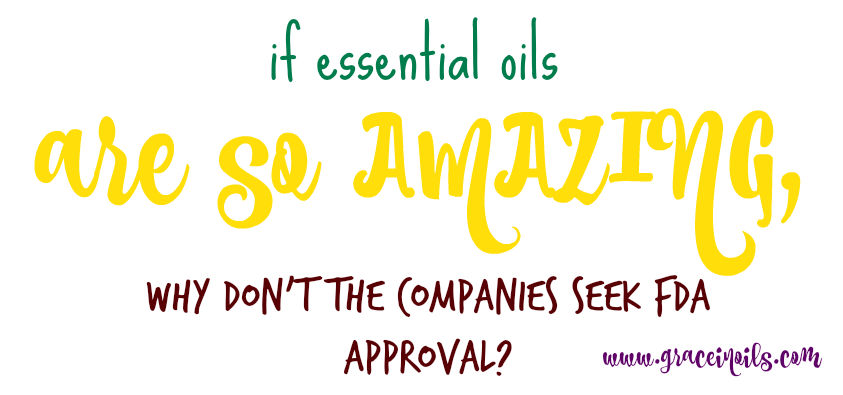I get asked this question often: If essential oils are so AMAZING why don’t the companies seek FDA approval? It’s a complicated questions. Many Essential Oils are on the FDA GRAS list and are approved for use under the umbrella term of aromatherapy. Essential oils are amazing and various cultures have been using them for years. The uses of essential oils are too numerous to list in this blog. Read on to learn more about why Essential Oil companies are not seeking out FDA approval of their product for use as a drug.
Essential Oils are natural products and as such they aren’t patent-eligible. Also, essential oils are distilled from plants and since the growing condition, location, yield, soil quality, etc. may vary from year to year it would be impossible for a company to verify with any certainty to the FDA that their Peppermint essential oil, for example, would match a set chemical profile every harvest.
Per the FDA Investigational New Drug Application page:
Manufacturing Information – Information pertaining to the composition, manufacturer, stability, and controls used for manufacturing the drug substance and the drug product. This information is assessed to ensure that the company can adequately produce and supply consistent batches of the drug.
As discussed above the chemical profile of essential oils can vary from crop yield to crop yield. The variance is enough in the case of clove that the eugenol content can range from 36-95% so a company submitting an IND would have difficulty “supply[ing] consistent batches” of essential oils. In Phase 1 of drug testing researchers look at how a drug is “absorbed, distributed, metabolized, and excreted” if a ‘drug’ or in our case essential oil constiuents, given their very nature, varies during each step outlined above it would fail this first phase. The essential oil may very well be effective but if it is not administered according to the same composition every time it is ‘used’ by the body then it fails this crucial step–even though it works!
If an Essential Oil company were to apply for FDA approvals they would need to guarantee an end product that would match a set chemical profile every time it was grown and distilled. This product would not be patent-eligible as it is not a ‘genetically-altered living thing’ so that company would not have an exclusive right to the FDA approval. U.S. patent law allows that genetically-altered living things are patent-eligible i.e. a newly synthesized chemical compound or molecule. If the EO company were to synthesize a compound from the essential oil or plant then that compound, and that compound only, would be available for a patent and the rigorous testing could begin. Many drugs currently on the market have their humble beginnings in plants. Part of the beauty of essential oils though IS that the end product will vary from season to season depending on growing conditions. I don’t want to delve into the reasons WHY that is in this blog article but it is important to note and a very interesting quality of true essential oils and how they interact with their environment.
What is ‘Drug Lag’ in the U.S.?
‘Drug lag’ is the difference between the time the drug is available in Europe versus the U.S. While a governing body regulating the drug industry sounds, on paper, like a very appealing thing in practice it can cause a delay in drugs reaching the market and to its final recipients: the patients who may be in desperate need of treatment. At this time there is no evidence that the ‘drug lag’ in the U.S. brings greater safety to patients. In comparison with Spain and Great Britain, the withdrawal rate in postmarket safety of drugs in Spain was 3% and Great Britain 4%.
Dietary Supplement Rules & Regs vs. Drugs
I want to look at dietary supplements very quickly. Dietary supplements are ‘considered safe until proven unsafe’ vs drugs which are ‘considered unsafe until proven safe.’ The reason dietary supplements are considered safe until proven unsafe is due to the Dietary Supplement Health and Education Act (DSHEA). The DSHEA states that supplements cannot have anything in them that may have a significant or unreasonable risk of illness or injury when used in accordance with the label. The onus is on the FDA to prove the product poses a risk in the case of supplements; conversely it is on the drug manufactures to prove safety in the case of drugs.
Why do we care about the DSHEA? To answer that we need to look at folate, or folic acid. In 1992 the CDC recommended that women of child-bearing age take folic acid supplements. The FDA came out against this recommendation stating prosecution for any manufacturer that used the recommendation on its product label. In 1994 Congress passed the DSHEA which allowed manufacturers more leeway on advertising without running afoul of the FDA. Starting in 1998 the FDA began REQUIRING fortification of products with folic acid.
In the case of aspirin, despite clinical studies showing aspirin effect in preventing deaths if given during and after heart attacks, the FDA prevented manufactures from advertising this claim. Later the FDA relented allowing the claim for heart attack patients however it is not an allowable advertising claim to use aspirin as a preventative measure for those at high risk for a first heart attack.
Vitamin C is a dietary supplement and as such it does not go through FDA approvals. The studies on Vitamin C are extensive and the diseases it may have an impact on are many. While Vitamin C is undergoing clinical trials in relation to its treatment use in cancer patients not all of the benefits, or off-label usage if you’ll allow the term, will undergo clinical trials. Since Vitamin C falls under dietary supplementation unless a pharmaceutical company were able to isolate and synthesize the compound in Vitamn C that helps lessen cold duration, for example, then the pharmaceutical company would be unable to patent the drug. No patent = no money as any company would then be able to make the same claim with their Vitamin C.
While the FDA certainly has its place it is not an infallible agency. By tying essential oils up in FDA approvals many would lose out on the benefits of said oils. There is also the matter of choosing what ‘claim’ to apply for FDA approval on. Looking at Lavendula angustifolia and the many studies on its myriad of uses: which would YOU pick for the FDA approval process and which uses would you relegate to ‘off-label’ usage?
What is Off-label Usage?
Amoxicillin is a drug and its on-label usage is the treatment of respiratory tract infections yet it is commonly used in the treatment of stomach ulcers and mentioned in medical guides for use in such a manner. Since it is no longer under patent it will most likely never gain on-label usage for stomach ulcers. From this example by narrowing Lavendula angustifolia approval to one usage for the ease of passing through the approval process you would effectively limit its use and prescription in medical settings. By turning a natural product, that has been used safely for thousands of years, into one that requires a prescription you would limit who might have access to said product. Those that might use it for an off-label usage might have a difficult time proving to their doctor their need and obtaining a prescription.
Last Thoughts
Instead of asking “Why don’t essential oil companies apply for FDA approvals?” we should be asking “Why WOULD they apply for approvals and submit to testing given all we have discussed above?” There would be no-end benefit to the consumer and it might actually limit or delay the use of the essential oil to the end product user. As in the case of folic acid the FDA stance delayed the beneficial information trickling down the the consumers and potential mothers who need the supplementation for healthy neural tube development. There would also be no monetary gain (these are companies after all and their bottom line would be affected).
In the case of Young Living where they are fully committed to Seed to Seal and allowing plants to thrive in their natural environment the impact of trying to ensure a homogeneous end-product would be a shift to greenhouses perhaps where temperatures & environment could be regulated; this could have a huge impact on the effectiveness of the oils and even then a standardized byproduct would not be guaranteed to pass the standards of the FDA. The money they pour into farms and product development for their members would be shunted into clinical trials and that money might not ever be returned due to, as referenced above, other companies would be able to use the same studies citing their oils even though they aren’t held to the same standards as Young Living oils.
Just because the companies or oils do not have FDA approval as a ‘drug’ DOES NOT MEAN they have not been subjected to rigourous testing. Doing a search on essential oils, or essential oil components, on PubMed.com reveals over 16000 search returns. Essential oils have been used in various forms for thousands of years. Many of the drugs we use today have their early roots in synthesis of compounds from plants. Some essential oils are listed in the OTC Review/Drug Monographs along with their intended labeling.
I have talked about essential oils extensively before in Why I Only Use Young Living, Are Essential Oils Regulated in the U.S. and Can Your Essential Oil Company Back Up Their Big Claims Part 1 and Part 2 From those articles we learned how exacting Young Living is in regards to their Seed to Seal process. We’ve learned that there are no governing bodies regulating what companies can say in terms of their essential oils and how important it is to know where your oils are grown! We’ve learned that other companies may try but they just can’t stand up to the 20+ years experience Young Living has. In my mind Seed to Seal is all I need but I was once a skeptical consumer like you and so it is a great question! I wanted to know the answer too and once I started digging into the essential oil world I never stopped. The oils speak for themselves. Give Young Living Essential Oils a try! I offer my readers an opportunity to use my wholesale membership so they can purchase an oil or two and get started with Essential Oils in their home.



I also want to add that just because a drug is, “regulated” by the FDA, it doesn’t guarantee safety. Not by a long shot. Website posted above about the FDA approved drug, Vioxx. After Vioxx killed over 27,000 people, the FDA decided that the drug wasn’t safe after all and it was recalled. To hold ourselves to FDA standards is laughable. Accutane and Cylert ring a bell for anyone? Two other FDA fails.
I completely agree! That’s why drugs have the laundry list of side effects that could be caused by taking them. Thank you for stopping by my blog and for your comment.